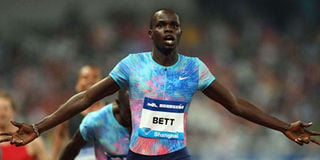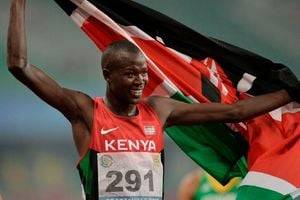Happening Now: DP Gachagua's impeachment motion in Parliament

Kipyegon Bett of Kenya reacts as he wins in the men’s 800m during the Shanghai Diamond League athletics competition in Shanghai May 13, 2017.
Kipyegon Bett, the 2016 world under-20 800 metres gold medalist, died a depressed man after being banned for four years (from 2018 to 2022) from active sports due to doping.
He was found guilty of using Erythropoietin (EPO), a banned blood booster. He could not cope with the scrutiny that followed as his career ground to a halt.
For seven years now, the 26-year-old athlete lost focus and became an alcoholic. Although an autopsy has not been done on his body, relatives believe excessive drinking affected him adversely, leading to his death.
The family confirmed that the youthful athlete failed to stop drinking heavily to focus on reviving his athletics career even after the ban was lifted on August 18, 2022.
“When alone, Kipyegon used to cry a lot over the frozen bank accounts and kept wondering aloud why he could not be allowed access to the money he earned through sheer sweat,” his mother, Sarah Chepkoech Rono told Nation Sport at the family home in Koliongewet village in Kiptere, Soin Sogowet Constituency in Kericho County.
“I got to a point where he would solicit for as little as Sh10 and Sh20 to buy alcohol. It was very painful for us to see him go downhill, eventually falling sick and dying in his hospital bed. It is the most painful thing to happen to a parent,” Mama Sarah said.
Mama Sarah said the family had done all it could to provide support and counseling to Bett in vain.
“Following the suspension from active athletics, which took four long and painful years, he took into drinking alcohol, starting from local bars before downgrading to illicit brew dens,” she said.
At some point, Bett’s father, Isaiah Kirui Rono, fell sick of watching his son’s life getting worse by the day, but he later recovered and offered his child the much-needed support as a parent.
Mzee Rono said the athlete was a teetotaler before the ban was handed down to him for an alleged case of doping, which he disputed to the day he breathed his last.
Bett started drinking alcohol when he was suspended from active athletics and he never got support either from Athletics Kenya, the Sports ministry or any known organisation or individuals to cope with the challenges he faced,” Mzee Rono said.
The family claimed that Bett did not have access to his bank accounts after it was frozen following the ban.
“He told us shortly before he was banned from athletics and the accounts frozen that he had Sh15.6 million in the bank, but he couldn’t access it even after the suspension was lifted,” Mzee Rono stated.
He said it was unfortunate that his son was left alone and literally on his own, without any support mechanism following the suspension.
“I appeal to Athletics Kenya and the Ministry of Sports not to condemn athletes who have been suspended over cases of doping. These cases should thoroughly be investigated and athletes, most of who are likely to be innocent, should be supported ro cope with the suspension” Rono said.
Serves as a pastor
Mzee Rono who is a pastor with the Free Pentecostal Fellowship in Kenya (FPFK), said Bett was his third-born child in a family of six children. Two other children in the family are athletes, most notably Purity Cherotich Kirui, who is a 3,000m steeplechase runner.
Kipyegon attended Koliongewet Primary School, and later Kipetere Secondary School where he sat his Kenya Certificate of Secondary Education in 2015.
He started his athletics career while in secondary school, and later joined Kiptere Athletics Club in Kericho, where he linked up with his long-term coach Japeth Kemei.
Following his ban from athletics and freezing of his bank accounts, the family claimed that a car of Toyota Prado, which he had bought and was paying for in installments, was repossessed from him by the seller.
“The dealer repossessed the motor vehicle after he failed to raise the final payment of Sh200,000 due to the dealer. It worsened an already bad situation for him,” Mzee Rono said.
“Kipyegon was not a wasteful man and when he received his first payment of Sh3 million in 2017, he invested it in a parcel of land. We are from a very humble background and he was focused on improving the family status, ” Mzee Rono observed.
Kipyegon fell sick a year ago, but his situation deteriorated last month and was taken to a local clinic that referred him to AIC Litein Hospital in Bureti Sub-county in Kericho for further treatment.
At AIC Litein, he underwent treatment as an outpatient. On September 28, he was asked to return for a follow-up check-up on Monday (October 7), but it was never to be because he died a day earlier after his condition worsened last Friday
“We took him back to AIC Litein where we were referred to Tenwek Hospital in Bomet County for endoscopy services,” Rono said.
Bett’s uncle, Jeremiah Rono, said it was unfortunate that Kipyegon did not get any support from the government, his managers, and Athletics Kenya during the ban, and after it was lifted.
“Kipyegon did not know what to do after the ban was lifted and how to return to full-time competition as there was no support from anyone. He felt condemned and went on to drink more and more, affecting his health,” Mzee Jeremiah said.
Kipyegon planned to construct rental houses next to Kabianga University on a piece of land he bought with the proceeds from his athletics career.
“He eventually sold off the land after he became broke and did not invest the proceeds from the transaction but used it all up in alcohol,” Mzee Jeremiah said.
On Sunday morning before he died, Bett vomited blood but could communicate with doctors and family members. His organs failed at around 12:40pm, according to the family.
“He was the light and pillar of the family, we depended on him a lot before things started to spiral downwards,” Mzee Rono said.
The athlete had promised to buy his father a car for use in his evangelism work, and for running personal and family errands.
“He was a disciplined and focused athlete before the doping problem arose. Unfortunately, he never recovered from it,” Japheth Kemei, his former, coach said.
Kipyegon said in an earlier interview that he was not guilty of doping as claimed and that he was forced to sign documents incriminating himself.
“One person came to take samples from me, which I questioned as there should be a witness. When I raised the matter I was slapped with suspension,” Bett said in an earlier interview.
He claimed that he fought the false claims, but was allegedly abandoned by his managers and coach.
After being banned from athletics activities in 2018, Bett did not get any psychosocial support, except encouragement from his family.
John Kimetto, an official of Athletics Kenya in Kericho, said it was unfortunate that the athlete died while undergoing treatment.
“Our condolences to the family for the loss, and to the sports fraternity in Kenya at large,” Kimetto said.
Yesterday, villagers thronged the family home to condole with the family for the loss.







